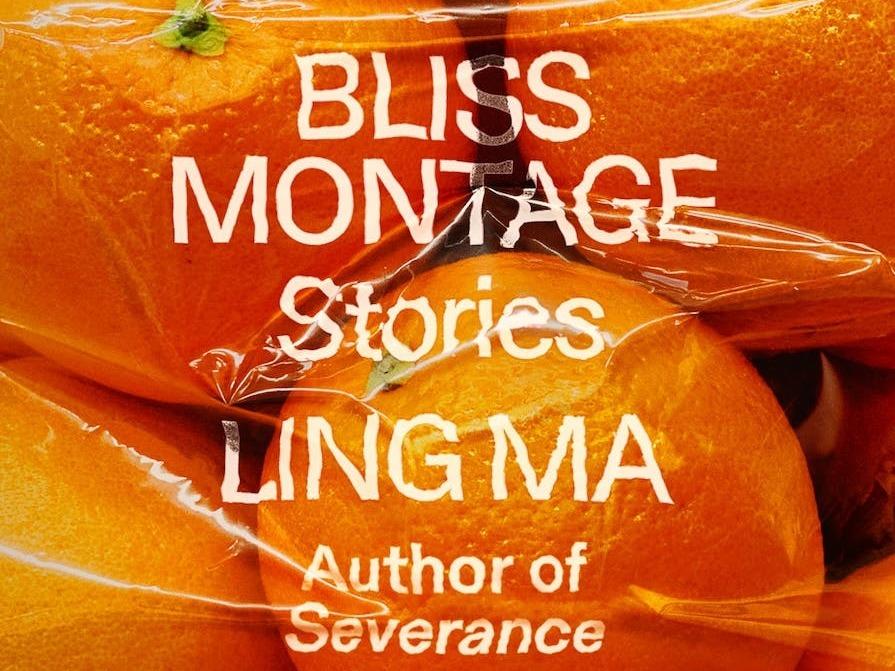Section Branding
Header Content
Ling Ma's stories start out familiar but get very, very weird
Primary Content
Ling Ma's 2018 debut novel, Severance, imagined a world ravaged by the sudden onset of something called "Shen Fever" — a fictitious infection that originated in Southern China. By early spring of 2020, Ling Ma was being hailed as an oracle of the pandemic.
But the prophetic quality of Severance only enhanced its power. The novel was already disturbing in and of itself because of its sardonic tone and its mundane imagery that smoothly morphed into the macabre. Ma's writing, in short, stays with you whether you want it to or not. And, so, I felt reluctant, but compelled to pick up her new book, a collection of short stories called Bliss Montage.
In one of those short stories, "Office Hours," a film professor declares to his class: "It is in the most surreal situations that a person feels the most present, the closest to reality." That pronouncement could serve as an epigram for this entire collection, an apt way to characterize its distinctive aura. Take the opening story, called "Los Angeles." Here's how our narrator introduces herself and her world:
The house in which we live has three wings. The west wing is where the Husband and I live. The east wing is where the children and their attending au pairs live. And lastly, the largest but ugliest wing, extending behind the house like a gnarled, broken arm, is where my 100 ex-boyfriends live. We live in L.A.
The deadpan tone of that narrator's voice implicitly urges readers to "just roll with it" and so we do. The Husband, who our narrator tells us she met on LoweredExpectations.com, only speaks in "$$$," not words, which is very funny on the page.
But nothing is just one thing in Ma's writing: Satire swirls into savagery; a gimmicky premise into poignancy. What does this story mean? Maybe something about the truth of most of us living with memories of people — old lovers and others — populating our headspace, except here the memories and the space are made literal. But beware: Another story, called "Peking Duck" explicitly warns against asking of any story, "What's the lesson here supposed to be?"
"Peking Duck" is a dazzling box-within-box story that reads like auto-fiction. In it an unnamed female narrator recalls moving to the U.S. from China as a child and living with her parents in Utah, as Ma herself did. There, the narrator's father goes to graduate school and her mother works as a nanny. Years later, when the narrator is a student in an MFA program, she writes a short story about an incident she witnessed when a creepy salesman came to the door and fixated on her mother. When she workshops the story, the narrator hears criticism from a fellow Asian student that: "it's just a tired Asian American subject, these stories about immigrant hardships and ... intergenerational woes."
That critic may be right about the subject, but not about the technique: In Ma's hands this story is a rough tug-of-war between daughter and mother who vie with each other for control. The answer to the vexed question of "Who does a story belong to?" seems to be: "Whoever is left holding onto it at the bitter end."
Every one of these eight stories ventures out of familiar situations into the weird. In "Tomorrow," a story set in the near future, a pregnant woman discovers her unborn baby's arm protruding out of her and waving. "It's not ideal [a doctor assures her], but I've seen worse." In "G," two women take a recreational drug that frees them from, among other things, "the male gaze" by making them disappear; and in the aforementioned "Office Hours," another professor discovers a portal to a different dimension in her office closet.
All of the stories in Bliss Montage are haunting; none are didactic. Ling Ma writes with such authority that we readers are simply swept along, like that professor, through the portal. If sometimes we wonder where we've ended up, maybe that sense of dislocation is the desired final effect.
Copyright 2022 Fresh Air. To see more, visit Fresh Air.

